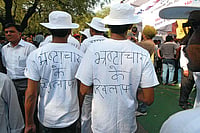In reply to a question about his views of “western civilisation”, Gandhi is said to have remarked: “It is a good idea!” The resurgence of “civil society” in the past two decades has led to similar ironic comments: “Are the rest then uncivil?” and the like. But there is a serious question that needs articulation and addressal to make the current debate meaningful. Just what is civil society, and how does classifiying it help us deal with the contentious issues we face? For, membership in the club, obviously, is not based on good behaviour. As with all terms used to classify and label, the label itself needs to be unpacked.
At this point of high-profile “civil society activism”, its definition is muddled, and with good reason. If everything outside government is civil society, then it includes the RSS and the CPI (Maoist), the Lions, Rotarians, caste-based associations, including khap panchayats, human rights organisations, campaign and academic groups, corporate social responsibility organisations, private public partnerships (PPPS) and even individual crusaders like Irom Sharmila. The list could go on. While it is true that this categorisation probably excludes state actors, it is not clear whether it includes everyone else. There is, in fact, a history to this over-generalisation.
Four decades ago, those outside government who wanted to work for a cause were part of voluntary organisations (“VOs”). As registered societies under the Societies Registration Act proliferated, the term non-government organisation (NGO) became popular. Another misleading definition by negation. The absurdity became evident as the category was found to be too broad, and narrower acronyms began to emerge, such as INGOs (international NGOs), ENGOs (environmental NGOs) and even GONGOs (government-organised non-governmental organisations)! Many cringed at being termed NGOs, and kept attempting to explain the plurality of organisations illogically grouped together.
NGO is now passe, the parlance of the times is ‘civil society’. The creation of such categories is not innocent. It allows power structures to arbitrarily sideline participants. Civil society is a term used in debates in the west which greatly valued non-state players. It assumed more importance in Eastern Bloc countries—in totalitarian states where the Party was both the state and the people. A category that defined itself in negation to both the state and the Party was required.
The Indian context is altogether different. In a democracy struggling to get the state to represent the people’s interest, the term civil society might be of little use. Is it useful, then, to understand this current anti-corruption upsurge?
What exactly is this civil society? More pertinently—who are they? The simplistic answer—formations outside state institutions—offers a litany of questions and answers none. Why then ‘civil society’? Merely because it allows the media to ignore the complexities and pass verdict. The broad spectrum of ideologies and strategies, sometimes conflicting under one definition, baffles us. In short, we’re using a category that leaves us poorer in our understanding. It might even be convenient for those who want to shape this anti-corruption campaign without looking at the details. When a term confuses more than it defines, it might be time to dispose of it.
Are Baba Ramdev and “Team Anna” part of the same formation? Should the media not focus on more pointed questions about whether the two campaigns are separate and whether they have the same demands. There are visible and pronounced differences between the demands that Baba Ramdev seemed to make in Delhi on June 4, and the arguments Anna Hazare brought for a stronger Jan Lokpal Bill. The debates around the specifics in the public domain will facilitate more meaningful discourse, providing the citizens an opportunity to make better informed choices.
Questions that delve into the political persuasions of the two groups are also relevant. The Ramdev stir has turned into a platform for the RSS and its “parivar” to launch its own political campaign. When powerful political forces throw their weight behind a fledgling movement, the people will begin to question where exactly it will lead to. Pointed questions, and specific answers, will not permit us the use of terms such as civil society to obscure and confuse.
In another context, the questions put to the National Advisory Council (NAC) and the Joint Drafting Committee (JDC) regarding legitimacy and capacity to draft policy and laws (regardless of membership) need answers. In any case, the greater duty is to bring onboard and consider the amorphous views of civil society. Complex democratic societies do not come with binary perspectives of state and civil society. This plurality must be recognised to go beyond artificial consensus and engage in meaningful public discourse.
Aruna Roy and Nikhil Dey are RTI and social activists.

























